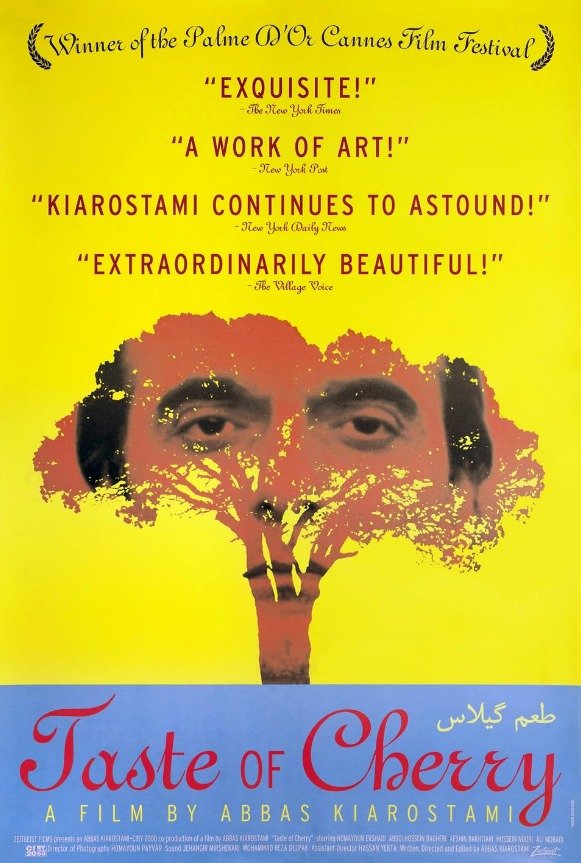NOOB FILM REVIEW - TASTE OF CHERRY by Abbas Kiarostami in MUBI
SYNOPSIS
An Iranian man drives his car in search of someone who will quietly bury him under a cherry tree after he commits suicide.
REVIEW
The first scene already giving me the goosebump because it started with Bismillahirahmanirrahim. In the name of God the Most Gracious, Most Merciful. The late Yasmin Ahmad had the same in her film openings.
After 15 minutes of watching, it is amazing to see how much stories and information are being said with minimal dialog and camera movement. It is just the protagonist driving in his car. And I can understand why this film won the Palme d'Or at the 1997 Cannes Film Festival.
In my observation, a 'good' film nowadays is judged by too much wow factor and I can understand why Martin Scorsese said about Marvel films being "amusement park" rides. It is not going to be surprising why modern viewers would watch Taste of Cherry and walk off or fall asleep in the first 15 minutes and it is not their fault.
As Scorsese himself has said it is just "...not cinema" where cinema is "...of human beings trying to convey emotional, psychological experiences to another human being."
As I have said earlier about minimal dialog and camera movement, this film has what you call pointers or in film terms "semiotics" which drive observant viewers into the narrative. In this case, it is the barren land of Iran. The things that are said about their life conditions ultimately reveal the purpose of why the protagonist (Mr. Badii) drives around. The open ending might understandably disappoint the modern audience but that is why films like this are timeless.
We have seen a lot of films doing the same thing. Driving in the car and going places. Other famous ones are Taxi Driver by Scorsese and Drive My Car by Ryusuke Hamaguchi. In Malaysia we have Dari Jemapoh ke Manchestee and Prebet Sapu. Also, another one that I have not watched but I know is around the same style of narrative is Terbalik by the Tanakas.
The roads and paths taken in this kind of film by Mr. Badii can also be metaphorical of the path of his life and the interaction with other characters and events shows mostly how we are all tied together in this huge web of life. Joseph Campbell took an example from Hinduism of this being the Net of Indra where one's doing will affect others, as Schopenhauer also said.
As you go further into the film, I realize that Mr. Badii is looking for someone to bury him and pay him for doing so. Not just anyone. But someone who is voluntarily willing to assist him in killing himself. Suicide.
He finally found someone, an old man (Mr. Bagheri) who was willing to do it. A man who tried to kill himself earlier in his life but something happened that made him stop. As he threw the rope over the branch and hung himself, the branch shook and mulberries dropped and he grabbed and ate some of it. Then a group of school kids came and joined him doing it. Then he brought some back to his wife and saw the joy on her face. Although Mr. Badii still insists on doing it, during the last scene we can see the look on his face probably having second thoughts. Does the old man come in the morning and bury him? Like Nolan in Inception, Abbas Kiarostami left it to us. But the ending is not everything. Just as the saying goes, sometimes it is about the journey, not the destination.

A MINIMALIST ABSURDIST FILM
Philosophically (and most important to me), can be said that Mr. Badii chose suicide as an escape from the cycle of Absurdity symbolized by his driving the same path over and over again. Like in the Myth of Sisyphus. But Mr. Bagheri who chose life over suicide after his episode with mulberries accepted the Absurdism and became the Absurdist Hero. According to Albert Camus, suicide is the weakest response to the Absurd and acceptance is the strongest. Camus also applies it to Sisyphus who knows that life is a pointless, horrible chore but gets on with it anyway. Accepting it makes Sisyphus happy.
Also can be applied to Samuel Beckett's Waiting For Godot, which actually talks about Absurdism. The two main characters, Didi, Gogo, and Estragon seem to be trapped in a cyclical task of waiting for someone called Godot yet he never turns up. Quite similar to Sisyphus, both are confronted with the compulsion to find meaning where no meaning exists. Godot is a symbol of meaning.
Yet like our old man Mr. Bagheri, the Absurdist Hero earlier, Didi and Gogo have a servant and seem to accept the meaninglessness of his daily task and its Absurdism. The servant's name is Lucky. And at the end of Waiting For Godot when Lucky finally speaks. Didi, Gogo, Estragon, and the audience are also incapable of understanding a word he is saying. Another Absurdist Hero!
It can now be said that no matter what Mr. Bagheri said to Mr. Badii about life and why one should not end it, will never be understood by Mr. Badii. Like how you should experience a bite of the cherry to understand the taste of it yourself. No words can say it enough.
And no other way that one can be led to that except through a work of minimalist poetry such as this film. But one should open themselves first and vibrate at the same frequency.
Show. Don't tell. But that is for another wall of text.